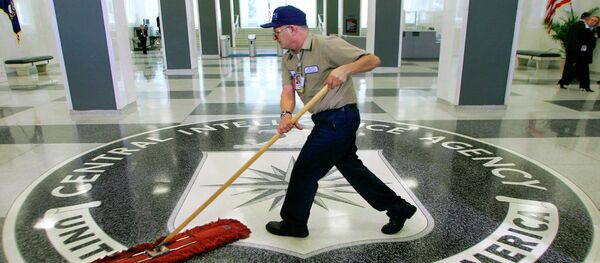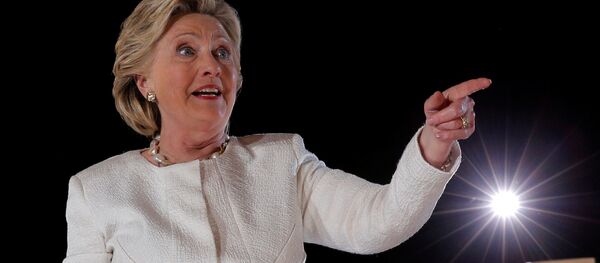Highlights of the Report
According to the author, the report covers "the motivation and scope of Moscow’s intentions regarding US elections and Moscow’s use of cyber tools and media campaigns to influence US public opinion."
The report read that "Russian intelligence obtained and maintained access to elements of multiple US state or local electoral boards." However, according to the report, the targeted or compromised systems were not involved in vote tallying.
As for the recent presidential campaign, the authors of the report concluded that the campaign was intended to "undermine public faith in the US democratic process, denigrate Secretary Clinton, and harm her electability and potential presidency."
"Moscow’s influence campaign followed a Russian messaging strategy that blends covert intelligence operations – such as cyber activity – with overt efforts by Russian Government agencies, state-funded media, third-party intermediaries, and paid social media users or 'trolls,'" the report read.
The document does not contain the names of hackers or hacker groups allegedly involved in the cyber activities. However, previously issued US intelligence reports linked such hacker groups as Fancy Bear (APT 28) and Cozy Bear (APT 29) to Russian intelligence.
In particular, according to US intelligence analysts, Cozy Bear were one of the hacker groups behind the of Democratic National Committee (DNC) email hack.
After the emails were leaked, Clinton said that Russia was responsible for the hack as well as the publication of some unspecified DNC documents.
On Saturday, President-elect Donald Trump said that the DNC were negligent in securing their private information.
"Gross negligence by the Democratic National Committee allowed hacking to take place. The Republican National Committee had strong defense!" Trump wrote on Twitter.
Gross negligence by the Democratic National Committee allowed hacking to take place.The Republican National Committee had strong defense!
— Donald J. Trump (@realDonaldTrump) 7 января 2017 г.
Mysterious Hacker
In early-summer, Guccifer 2.0 wrote in his blog that he obtained access to the DNC email leaks and then handed over the leak to WikiLeaks. The hacker illustrated his post with a report on Donald Trump, which was allegedly prepared by Hillary Clinton’s electoral office.
The pseudonym Guccifer 2.0 refers to Romanian hacker Marcel Lehel Lazar, known as Guccifer, who obtained access to Hillary Clinton’s personal emails in 2013.
Nevertheless, US intelligence analysts assess that there is a group of people linked to the Russian government behind the Guccifer 2.0 persona. Previously, the same assumption was made by cybersecurity specialists from ThreatConnect and CrowdStrike.
"Guccifer 2.0, who claimed to be an independent Romanian hacker, made multiple contradictory statements and false claims about his likely Russian identity throughout the election. Press reporting suggests more than one person claiming to be Guccifer 2.0 interacted with journalists," according to the report.
At the same time, Guccifer 2.0 has made repeated statements that he did not like Moscow’s foreign policy. The hacker has also repeatedly denied media allegations of his links to Russia.
"I read several reports, some experts found out that my proxy IP is hosted at a service that’s somehow connected with Russia and has a version in Russian as well as in English," Guccifer 2.0 wrote. "This is their strong evidence," he ironically added, as cited by The Wall Street Journal.
WikiLeaks and Russian Media
The US intelligence report also touched upon alleged links between the Russian government and the whistleblowing project WikiLeaks founded by Julian Assange.
"Disclosures through WikiLeaks did not contain any evident forgeries," the US intelligence assessed.
As a piece of evidence, the report cited Russian President Vladimir Putin’s comment that it was important the DNC data was exposed to WikiLeaks.
WikiLeaks commented on the report: "US government's declassified 'Russian hacking' report has the curious disclaimer that it is based on watching TV and reading Tweets."
US government's declassified "Russian hacking" report has the curious disclaimer that it is based on watching TV and reading Tweets. pic.twitter.com/Ac1Iyec839
— WikiLeaks (@wikileaks) 6 января 2017 г.
This is not the first time that the whistleblowing project has been accused of working in the interests of certain states. WikiLeaks has repeatedly denied such allegations.
"Nothing in today's declassified ODNI report alters our conclusion that WikiLeaks' US election related sources are not state parties," WikiLeaks said in Twitter.
"RT routinely gives Assange sympathetic coverage and provides him a platform to denounce the United States," the authors concluded.
The report described RT’s activities as a "broader and long-standing anti-US messaging" campaign.
On Thursday, Director of the US National Intelligence James Clapper said at a US Senate hearing on cybersecurity that RT had been "disparaging" of the US political system and was active in promoting its views on US hypocrisy regarding human rights and generally seeking out fissures in US society. Clapper also accused RT of spreading fake news stories.
In response, Simonyan said that the broadcaster only reports on real events happening in the US.
"The national intelligence head says that RT undermines the American system merely by reporting on what is happening in his country," Simonyan said.









